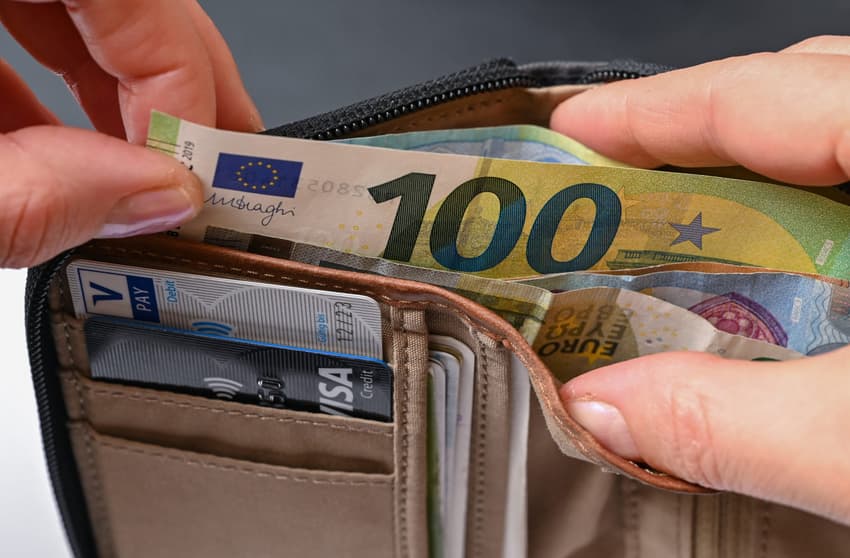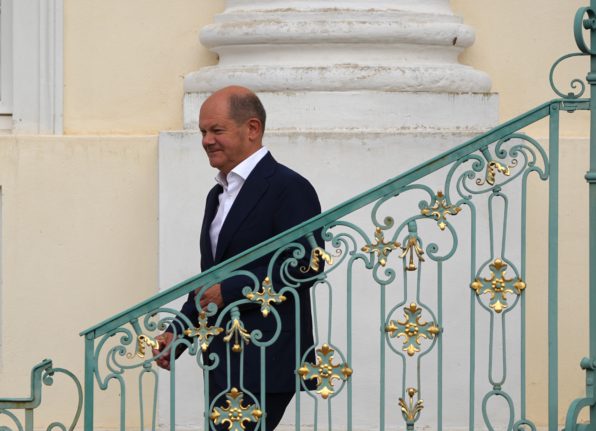What are Germany's proposals to help people with rising energy bills?

The parties in Germany's coalition government are meeting to talk about how to support people with the cost of living. Here's an overview of proposals so far.
What's happening?
Since Russia invaded Ukraine in February, energy prices have skyrocketed leading to high inflation and stress for households in Germany.
The governing coalition - made up of the Social Democrats (SPD), Greens and Free Democrats (FDP) - have passed two relief packages aimed at supporting people since then, totalling around €30 billion.
Among the headline measures are the €9 monthly transport ticket and a fuel tax cut - which both expire on Wednesday August 31st - and a €300 taxable payout for workers. There were also payouts for families and people on benefits.
Now the SPD, the Greens and the FDP want to agree on a third relief package. It will be one of the topics discussed at a cabinet retreat taking place on Tuesday and Wednesday in Schloss Meseberg.
Here's an overview of proposals we've heard so far:
SPD: Payouts to lower earners, €49 ticket and energy price cap
The centre-left Social Democrats are backing direct payments for people with low and medium incomes. A paper published by the SPD parliamentary group says that families and pensioners in particular should benefit, as well as students, trainees and recipients of unemployment benefit I.
Furthermore, the SPD argues that there should be a price cap for electricity and gas. Meanwhile, tenants should be protected from termination of their contracts if they cannot pay their utility costs.
Other proposals include permanently higher rates for those on benefits, and an increase and expansion of housing benefit. The party has also put forward the idea of a €49 public transport ticket to replace the €9 offer.

German Chancellor Olaf Scholz pictures at the cabinet retreat on Tuesday. Photo: picture alliance/dpa | Soeren Stache
READ ALSO: €49 ticket and payouts for lower earners - Germany's SPD plans new relief package
Greens: Support for most vulnerable, €9 ticket follow-up
Perhaps unsurprisingly, the Green party, which also leans more to the left, has put forward proposals that are similar to the SPD. The party leadership is also in favour of reforming the housing allowance, to which low-income workers in particular are entitled. The Greens also support the call for a significant increase in the rates for recipients of basic welfare benefits. The government is currently working on replacing 'Hartz IV' long-term unemployment benefits with a 'citizen's allowance' or Bürgergeld.
The Greens are also advocating a successor to the hugely popular €9 ticket. Both the Greens and the SPD want to impose a so-called 'excess profits tax' on energy companies. However, the pro-business FDP rejects the tax.
FDP: Help pensioners and students, and allows workers to keep pay rises
According to a paper from the FDP parliamentary group in the Bundestag, the FDP is in favour of a one-time payout to pensioners and students because these groups weren't the main targets of the last packages.
"In the current budget year, any further one-off government support as crisis measures before the coming winter (...) should be concentrated on those who need it most, especially pensioners and students," says the proposals.
The paper, drafted under the leadership of the group's vice-chairman Christoph Meyer, also introduces another tax policy proposal that could become important in the current situation, especially for negotiations between employers and unions.
"Should the collective bargaining partners agree on one-time payments as crisis measures" in response to "energy prices and inflation," it would be "conceivable to support these through tax exemption", says the proposal.
The Liberals also repeated their call for the "Inflation Compensation Act", which was recently presented by the Finance Minister and FDP leader Christian Lindner.
A central element of this law is to compensate for the effect of so-called ‘cold progression’. This is the term used to describe a creeping tax rise when salary increases are eaten up by inflation but still lead to higher taxation.
What happens now?
These proposals will be discussed and the coalition will come up with a firm plan for the third financial relief package. They want to have the package in place by October when the gas surcharge on consumers comes into force and energy prices are expected to rise further.
Comments
See Also
What's happening?
Since Russia invaded Ukraine in February, energy prices have skyrocketed leading to high inflation and stress for households in Germany.
The governing coalition - made up of the Social Democrats (SPD), Greens and Free Democrats (FDP) - have passed two relief packages aimed at supporting people since then, totalling around €30 billion.
Among the headline measures are the €9 monthly transport ticket and a fuel tax cut - which both expire on Wednesday August 31st - and a €300 taxable payout for workers. There were also payouts for families and people on benefits.
Now the SPD, the Greens and the FDP want to agree on a third relief package. It will be one of the topics discussed at a cabinet retreat taking place on Tuesday and Wednesday in Schloss Meseberg.
Here's an overview of proposals we've heard so far:
SPD: Payouts to lower earners, €49 ticket and energy price cap
The centre-left Social Democrats are backing direct payments for people with low and medium incomes. A paper published by the SPD parliamentary group says that families and pensioners in particular should benefit, as well as students, trainees and recipients of unemployment benefit I.
Furthermore, the SPD argues that there should be a price cap for electricity and gas. Meanwhile, tenants should be protected from termination of their contracts if they cannot pay their utility costs.
Other proposals include permanently higher rates for those on benefits, and an increase and expansion of housing benefit. The party has also put forward the idea of a €49 public transport ticket to replace the €9 offer.

READ ALSO: €49 ticket and payouts for lower earners - Germany's SPD plans new relief package
Greens: Support for most vulnerable, €9 ticket follow-up
Perhaps unsurprisingly, the Green party, which also leans more to the left, has put forward proposals that are similar to the SPD. The party leadership is also in favour of reforming the housing allowance, to which low-income workers in particular are entitled. The Greens also support the call for a significant increase in the rates for recipients of basic welfare benefits. The government is currently working on replacing 'Hartz IV' long-term unemployment benefits with a 'citizen's allowance' or Bürgergeld.
The Greens are also advocating a successor to the hugely popular €9 ticket. Both the Greens and the SPD want to impose a so-called 'excess profits tax' on energy companies. However, the pro-business FDP rejects the tax.
FDP: Help pensioners and students, and allows workers to keep pay rises
According to a paper from the FDP parliamentary group in the Bundestag, the FDP is in favour of a one-time payout to pensioners and students because these groups weren't the main targets of the last packages.
"In the current budget year, any further one-off government support as crisis measures before the coming winter (...) should be concentrated on those who need it most, especially pensioners and students," says the proposals.
The paper, drafted under the leadership of the group's vice-chairman Christoph Meyer, also introduces another tax policy proposal that could become important in the current situation, especially for negotiations between employers and unions.
"Should the collective bargaining partners agree on one-time payments as crisis measures" in response to "energy prices and inflation," it would be "conceivable to support these through tax exemption", says the proposal.
The Liberals also repeated their call for the "Inflation Compensation Act", which was recently presented by the Finance Minister and FDP leader Christian Lindner.
A central element of this law is to compensate for the effect of so-called ‘cold progression’. This is the term used to describe a creeping tax rise when salary increases are eaten up by inflation but still lead to higher taxation.
What happens now?
These proposals will be discussed and the coalition will come up with a firm plan for the third financial relief package. They want to have the package in place by October when the gas surcharge on consumers comes into force and energy prices are expected to rise further.
Join the conversation in our comments section below. Share your own views and experience and if you have a question or suggestion for our journalists then email us at [email protected].
Please keep comments civil, constructive and on topic – and make sure to read our terms of use before getting involved.
Please log in here to leave a comment.